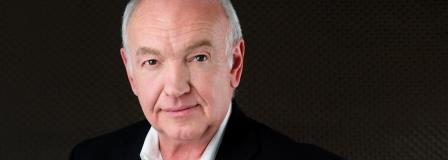
Joseph Kanon is an international bestselling author of eight novels, which have been published in twenty-four languages: Los Alamos, which won the Edgar Award for best first novel; The Good German, which was made into a film starring George Clooney and Cate Blanchett; The Prodigal Spy, Alibi, which earned Kanon the Hammett Award of the International Association of Crime Writers; Istanbul Passage, and Leaving Berlin. Now comes his explosive new thriller DEFECTORS. SHOTS wanted to know a little bit more about it ...
SHOTS: Your protagonist, Frank Weeks, is an American
defector living in Moscow in 1961. Is he
based on a real figure?
JK: No, Frank is
fictional, though some of the details of his life there are based on those of
the actual defectors—where he lives, which restaurants he likes, etc. The best known of the defectors, of course,
was Kim Philby, so I suppose Frank will be taken as a kind of American Philby,
but the characters are really not the same and I set the book in 1961, before
Philby’s defection, to avoid any sense of its being a roman a clef. Still, Philby is very much a presence—two of
his four wives wrote memoirs about their time with him in Moscow, wonderful
sources for details.
SHOTS: Most people know about Philby and Burgess and
Maclean in Moscow but I hadn’t realized there were American defectors there as
well.
JK: Yes, but only a
few. The British spies are much more
familiar to us because they’ve been written about, mythologized. And the Americans had either the bad luck of
getting caught (Alger Hiss went to prison for perjury, the Rosenbergs famously
were executed) or the good luck of escaping prosecution on a technicality
(Judith Coplon never served time). They
were also more scattered. Martha Dodd
ended up in Prague, Noel Field spent his last years in Budapest, and Maurice
Halperin didn’t take to Moscow, so moved on to Cuba instead. But Morris and Lona Cohen, for instance, were
welcomed as KGB heroes and given a nice flat on Gorky Street. She had been a courier for Ted Hall at Los
Alamos and they fled to Mexico in 1950, then later turned up in Britain posing
as a New Zealand couple, Helen and Peter Kroger, caught in 1961 in the Portland
Navy spy case. They were exchanged in
1969. Still, you’re right. The British spies had a higher
profile—certainly they’re part of the background of Defectors. Guy Burgess even has a cameo.
SHOTS: What drew you to this material?
JK: At first I was fascinated because I had known
a man whose brother was a defector and I was struck by the effect that had had
on everybody in the family, a world turned upside down. But it was really what happened afterward
that interested me, because most of us known so little about it (a gift to a
novelist). A spy is tipped off, makes a
run for it, and gets on a ferry or a plane and that’s the end. But of course it isn’t the end. Philby lived in Moscow for 25 years. What was it like for them? I was particularly interested in the spies
recruited in the 1930s because they had done it for ideological reasons, not
money or blackmail. They believed in
Communism. And now here they were at its
heart, distrusted as foreigners, kept under surveillance, field agents without
a field anymore.
SHOTS: Did you go to Moscow for research?
JK: Yes. I tracked down the flats where the real
defectors had lived, visited places they would have visited, etc. Of course Moscow is much changed—not many
luxury hotels with Kremlin views in 1961.
SHOTS: Did anything surprise you?
JK: The sense that the KGB had, and still has, of
itself as an elite service, almost a state within a state. They had special food stores, their own
hospital, their own compound of dachas.
This was the organization that presumably nourished Putin and that in
some ways is still waging a Cold War we thought was over. The economy may be a mess, civil rights a bad
joke, but the KGB/MSB just keeps going, making mischief however it can, as if
it were still the superpower of 1961.
It’s a society with espionage in its DNA.
What
the critics say:
'One of the
most exciting books I've read in years' Alexander McCall Smith on Leaving
Berlin
'Spectacular in every way' Lee Child on Stardust
'Tense and atmospheric, with sinister intrigue' Wall
Street Journal on Istanbul Passage
DEFECTORS, published June 01, 2017 Simon & Schuster Hbk £14.99
(discounted to £10.49 in link below)
Some secrets should never be told.
Moscow, 1961: With the launch of Sputnik, the
Soviet Union's international prestige is at an all-time high. And the most
notorious of the defectors to the Soviet Union, former CIA agent Frank Weeks,
is about to publish his memoirs. What he reveals will send shock waves through
the West. Weeks' defection in the early 1950s shook Washington to its core –
and forced the resignation of his brother, Simon, from the State Department.
Simon, now a publisher in New York, is given
the opportunity to read and publish his brother’s memoir. He knows the US
government will never approve the publication of what is clearly intended as
KGB propaganda. Yet the offer is irresistible: it will finally give him the
chance to learn why his brother chose to betray his country.
But what he discovers in Moscow is far
more shocking than he ever imagined …
Read SHOTS' review of DEFECTORS